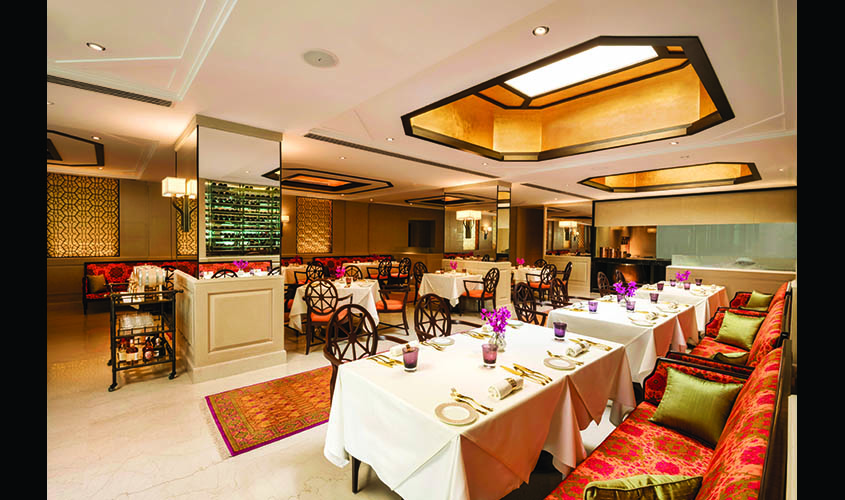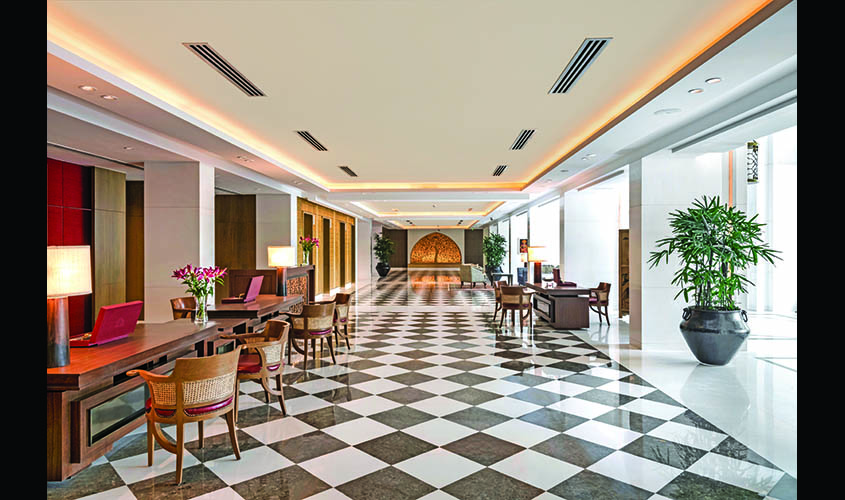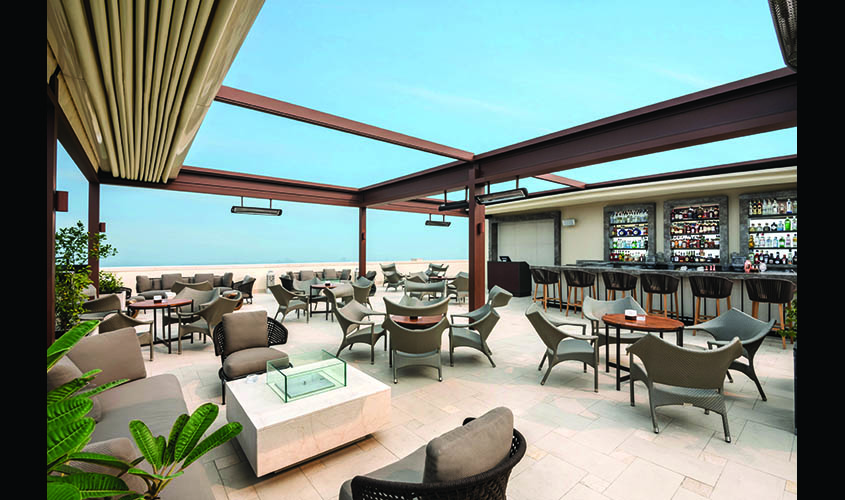The Oberoi, New Delhi, one of the national capital’s best known five-star hotels, has been a figure of monumental significance in the city’s history for more than half a century. Established in 1965, the hotel has been a pioneer in luxury and hospitality services, accruing a loyal international customer base over the years. It is no doubt a vintage property. But today, a lot has changed at the hotel, and changed for the better.
After having remained shut for 21 months, the hotel reopened its doors for guests earlier this year. The reason for this hiatus was a multi-million dollar renovation drive that was being carried out on this property. Post the upgrade, it is now a luxury hotel with a contemporary edge, offering its guests a modern experience on the grand scale. Despite the complete transformation here, the soul of the old Oberoi has been kept intact. Its symbolic representation is “The Tree of Life” wood sculpture—carved in one piece out of a Burma Teak tree—that has greeted guests since the hotel’s inaugural day in 1965, and it remains the centrepiece of the new Oberoi.
The renovation work took more than 20 months to complete, with an international team of designers, architects and decorators helming the project. The renowned New York-based designer, Adam D. Tihany was roped in for the overall facelift. On the reopening of hotel, P.R.S. Oberoi, Executive Chairman, The Oberoi Group, shed light on the idea behind the renovation. “When my late father, Rai Bahadur M.S. Oberoi, opened the hotel in the autumn of 1965, he wished it to be the most modern luxury hotel. I am confident that The Oberoi, New Delhi will continue this tradition.”
Today, when you enter the revamped hotel, the first design feature you come across is the steel screen called “Atithi”. At first glance it looks like an elegant art object, but is actually a three-layered structure signifying sunrise, noon and sunset—a welcome sign of sorts, saying that our doors are open 24/7.
Now for the major upgrades. Taking into account Delhi’s sky-high pollution levels, the hotel management has installed advanced air filters throughout the property. There is also an abundance of natural light now—from the lobby through the dining spaces, to the rooms and suites. In order to provide unparalleled luxury, they have refurbished and also reduced the number of rooms to make each room more spacious. The number now stands at 220 including 34 suites—a drop from the previous figure of 283.

One of the best things about The Oberoi, New Delhi remains its incredible location. The hotel overlooks Humayun’s Tomb on one side and the Delhi Golf Course on the other. Among the 32 five star hotels operated by The Oberoi Group, the Delhi one has always been special and one of its kind, known for its 24-hour room service, and its round-the-clock restaurants.
The management splurged a colossal Rs 600 crore on the hotel’s renovation. The amount spent on the property might invite assumptions about extravagant and glitzy décor, but when it comes to the interiors, The Oberoi is all about subtle tones and classic aesthetics. They have also retained all of their 7,000 artworks, with some dating back to the initial days of the hotel.
The hotel has had patrons flocking its fine dining spaces for decades now. There are now more reasons to dine at the hotel. The Oberoi, New Delhi has partnered with two internationally acclaimed chefs, who have crafted and designed the new menu.
The menu of Omya, a new Indian restaurant here, has been curated by the London-based Chef Alfred Prasad, who held a Michelin star for 13 years. About the association with the hotel, Chef Prasad said “I have always had great respect for The Oberoi hotels and to work with them on my first homecoming project is an honour. Delhi has had such rich and strong influences over the many centuries. At Omya, it is my dream to showcase India’s culinary journey through the lens of this majestic city.”

Another addition to their fine dining spectrum is Baoshuan, a Chinese restaurant. Chef Andrew Wong, of the Michelin-starred restaurant A Wong in London, is the mentor chef here and designed the menu at Baoshuan. Wong told Guardian 20, “The menu at Baoshuan is ultimately inspired by authentic regional Chinese cuisine. So many people are unaware of how diverse China is as a country and how this is reflected in the food. What people eat in Hong Kong it is totally different from that in Sichuan or Beijing for example. Then the challenge was to make this relevant for an audience in Delhi. We tried to experiment and play with new flavour combinations, and to find ways of making vegetables were more of a centre point.”
The fervour of The Oberoi, New Delhi’s iconic restaurant, Threesixty°, remains unchanged. Moreover, in contrast to their easy-going vibe of The Club Bar, they now have a new rooftop bar, Cirrus9, that’s perfect for partying and enjoying specially curated beverages.
Not to forget the treasure trove of comfort food—the famous patisserie at this hotel. It has a selection of cakes, pastries, chocolate bars, cheese and wine. They also offer exclusive desserts like coconut, orange and semolina cake.
The leisure factor at The Oberoi, New Delhi gives this property an edge over the others. Consider their extensive spa menu as an example, which is replete with all sorts of massage and beauty treatments. There’s also a sauna, temperature-controlled indoor and outdoor swimming pools, plus a 24-hour fitness centre.
Technology, too, plays a big part at the new hotel. Without doing anything drastic, the management has focused on making hi-tech upgrades throughout the property. Guests can now coordinate through in-room iPads; there are televisions embedded in bathroom mirrors; there are weather-sensitive retractable roofs.
The first big hotel in Delhi to undergo such a total transformation, The Oberoi, New Delhi has adapted itself fully to the present, while keeping its legacy and its historical essence intact.

